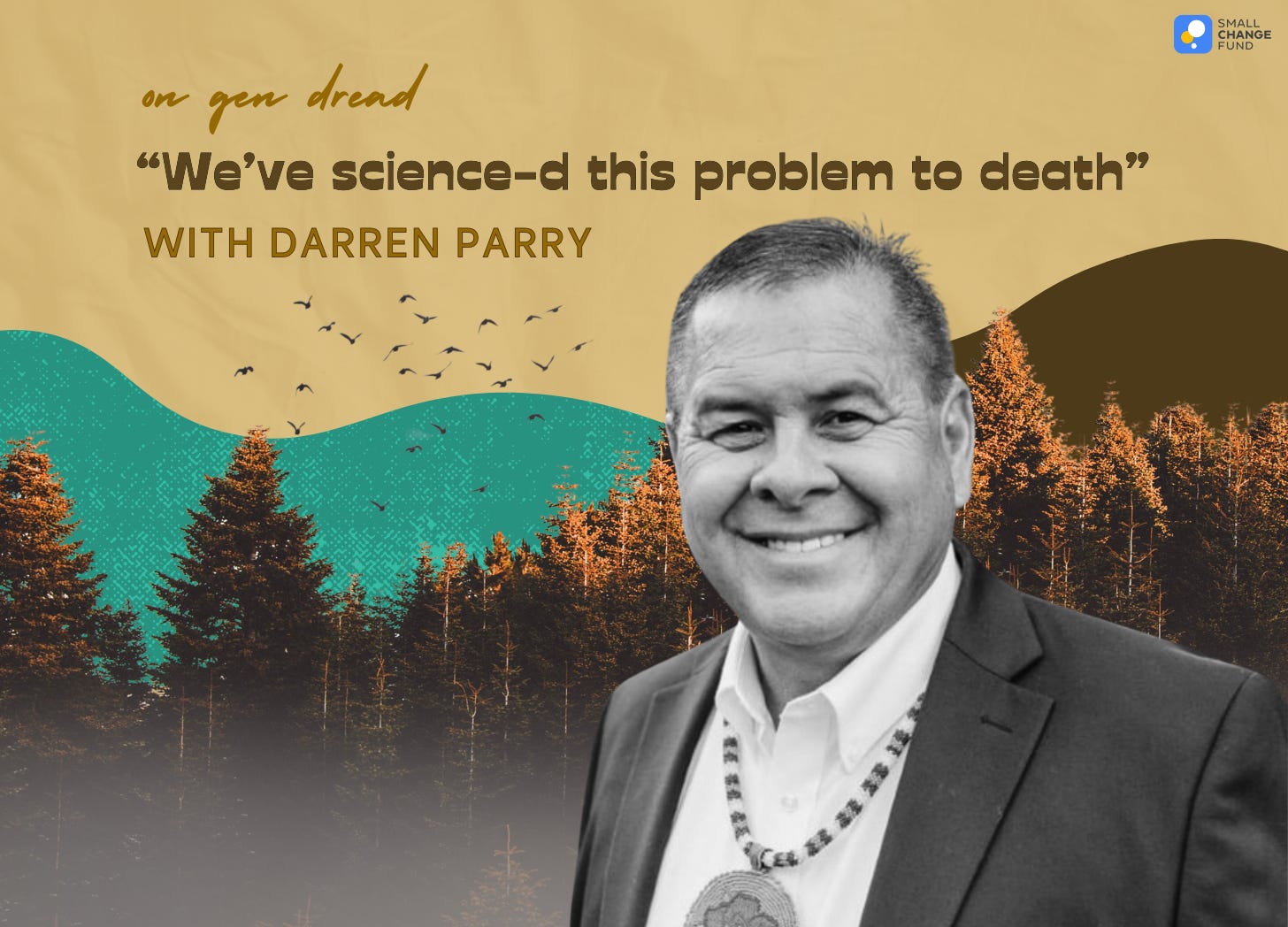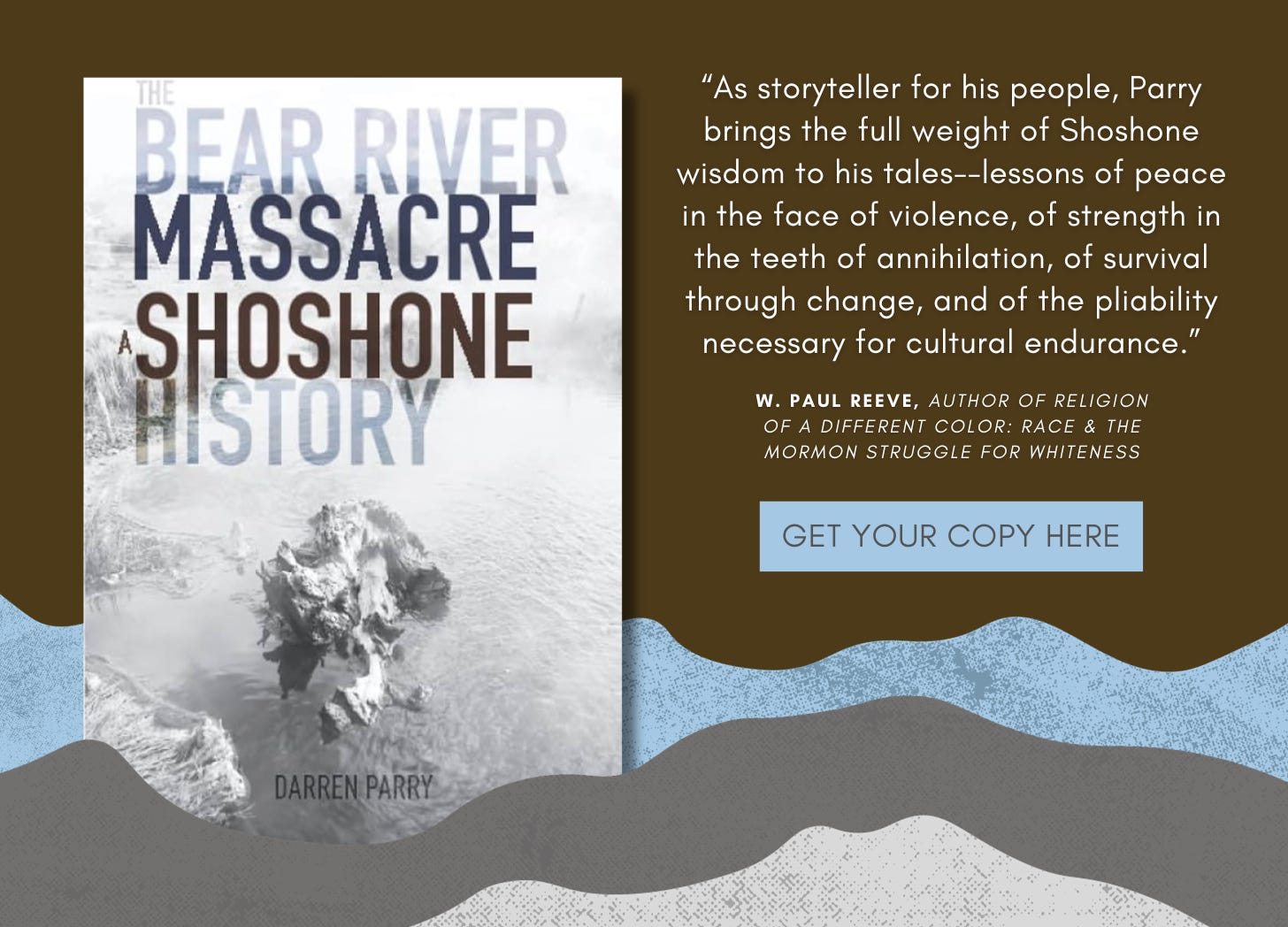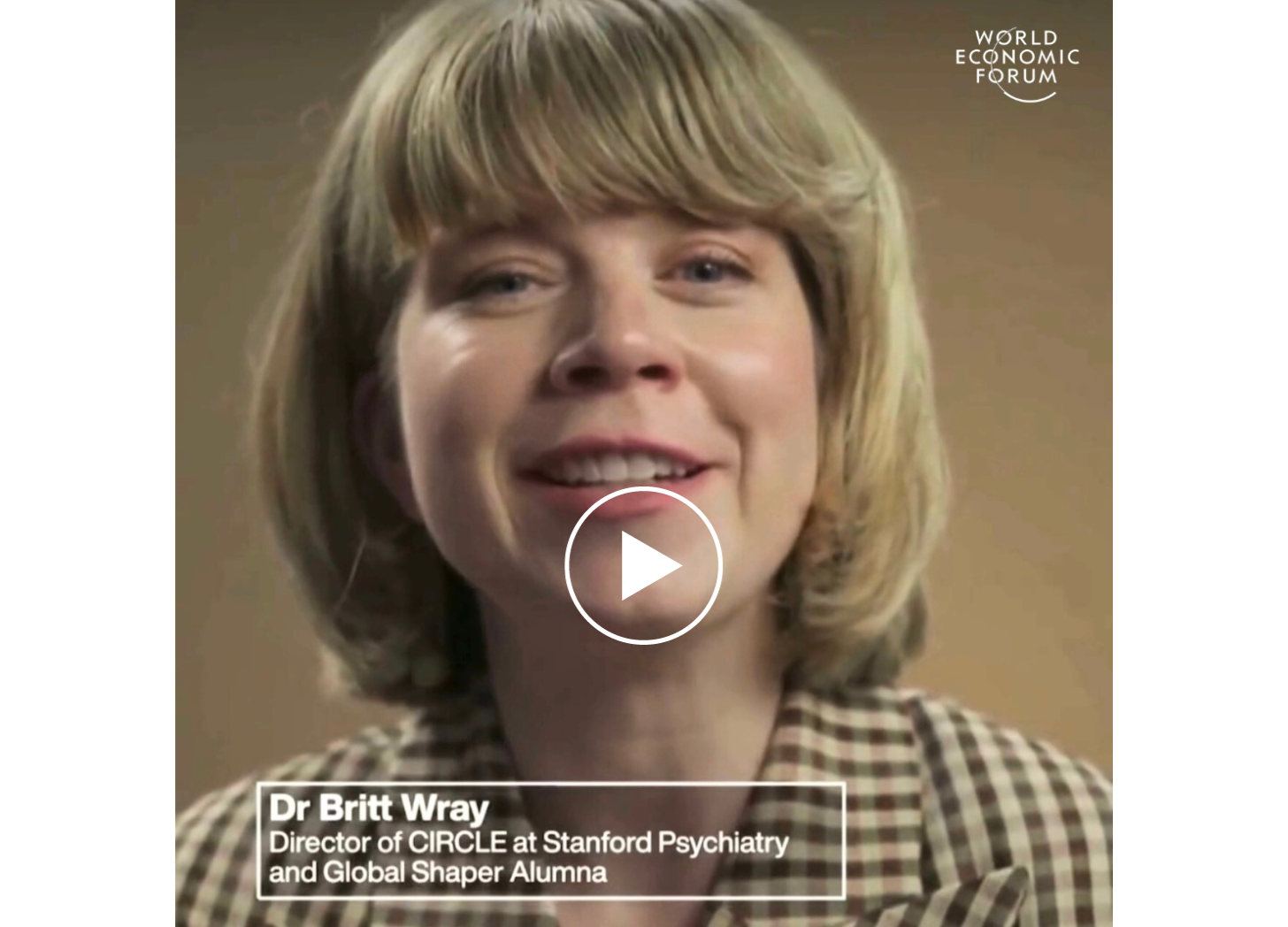“We’ve science-d this problem to death”
Shoshone leader Darren Parry wants Indigenous storytelling and heart-centered learning to drive climate work
As we look back on the extraordinary conversations we've had this year, we thought it fitting to end with a piece that highlights the values we hope to engender in our work at every opportunity: prioritizing community over individualism and humility over certainty. We know that modern coloniality and capitalism cast a powerful spell of hyper-individualism and hyper-consumerism; yet the indigenous wisdom that our dear friend Darren speaks of encourages a de-centering of the self, which naturally opens us up to wiser possibilities for connection, courage, and healing.
We'll be hibernating for the next few weeks, and when we wake up on the other side of a new year, our deepest wish is to feel a strengthened resolve to protect human and planetary health after having taken appropriate rest.
“My last few years on this earth better be about advocating for the environment”
For a very long time, Darren Parry has focused on the history of the Great Salt Lake: he fondly recalls growing up in the ‘60s near Antelope Island, Utah, on the shores of the lake, and going on plant walks with his Shoshone grandmother, listening to her talk about the water’s healing properties and how you could use the plants around the lake for food and medicine. As an adult, Darren poured himself into restoring the Bear River, one of the Great Salt Lake’s major tributaries. Then a few years ago, he wrote a book about the Bear River massacre of 1863, perpetrated by the US army against the Shoshone people. He’s done lectures all over the world about the lake’s storied and painful past.
But lately, at 63, Darren’s feeling like it’s time to shift his focus away from what was, and put his energy toward protecting the lake’s future. And as you’ll read today on Gen Dread, Darren strongly believes that the only way to save this crucial body of water – and others like it all over the world – is to infuse our climate response with Indigenous storytelling traditions that value humility and interconnectedness – two crucial qualities that are strikingly absent from dominant climate conversations.
GD: Can you describe why the Great Salt Lake was so meaningful to you growing up?
DP: I remember years where we couldn't get out to the island because the water was too high. It was too flooded out to walk the road. 25 years of growing up in this space, you kind of took the lake for granted. And so it’s hard now to see the shape that she's in.
For me, it was always a beautiful place where I heard stories and storytelling. The Shoshone creation story starts out there on the lake and on Antelope Island, so it's something that's been within my DNA, born within me. We're Northwestern Shoshones, which means our ancestral homeland would be Salt Lake City on the southern border to southern Idaho. Well, right in the middle of that is the Great Salt Lake. It was the heart of our ancestral homeland. We're the only tribe that can say that. So it played a huge role in our tribal history.
So what’s happened to the Great Salt Lake?
Start here for some essential background.
For those not familiar with the region, how has the lake changed since your childhood days?
20 years ago, there were only a million people living in Utah. But over time, development has taken a huge toll. There's now three-and-a-half million people. We're building more dams on these rivers that provide the lifeblood for the Great Salt Lake. You start damming those up and diverting those waters somewhere else, and that takes away a critical resource for the lake as far as its lifeblood. Now you factor in climate change. Evaporation out on that lake is a huge problem. It’s going to get hotter and hotter. And for a desert, that's not a good thing.
The thing is, we've science-d this problem to death. Science has allowed us to get to three-and-a-half million people. To develop the land. To extract every amount of water out of any nook and cranny that exists. But when everything's connected, there's a price to pay for that. We're seeing a huge decrease in the amount of water that actually gets to the lake now, and we need to get water to the lake to keep it healthy And so maybe we ought to start listening to Indigenous voices who stewarded the water for thousands of years and have a different way of looking at it. A values-based way of looking at it. And go from there and see what happens.
These are the values he’s referring to.
I had a conversation the other day with the president of the University of Utah and I said to him, look, I teach full time at the university, so I'm part of academia. But academia is set up to perpetuate capitalism. And I'm smart enough to know that we're not getting rid of this capitalistic system. But maybe we ought to start injecting Indigenous values into the system. Like, if we have this piece of property down by the Great Salt Lake in the marshlands, and a developer wants to come in and develop it, extract it, deplete it, and build an inland port, which is a big thing here in Utah now, that will bring traffic from all over and create more pollution – just not a good deal. But capitalism says we can do that if there's a developer willing to do it. Indigenous values say we can, but should we? And if we do, what effect is that going to have on the next generation or the following generation?
The Iroquois always had it right. They never made a decision without considering what effect that decision would have on seven generations ahead. Think about the implications for our future if our leaders ever governed that way. We've got to stop sacrificing our children and grandchildren's futures for the sake of short-term profits. Native values have always prioritized community over individualism. And the system that we're in today is completely hyper-individualistic. It’s all about how we can make a buck and get ahead at the expense of everything, including the environment.
As a person who holds these values but has to live within the system of academia, how do you reconcile your reality with your mental health?
Well, I sat through a symposium they had at the University of Utah Law School last year. There were 30 speakers and I was one of them. And I heard the scientists just telling absolutely catastrophic things that are going to happen. And then I got up and talked about Indigenous values and stories. I tugged at the heartstrings. Mine wasn't data and science and graphs. And I could see these scientists’ thinking, no, that's not what we need to solve the problem. It's a science problem. It's not a values problem. But like I said, all the science in the world won't make up for our selfish behaviours.
For me, learning takes place when you touch people in their heart. When you form an emotional attachment to the problem. That's when you start affecting change. And that's what Native Americans bring to the table. People will always forget facts and figures about history, about climate, about anything. But they will never forget how they felt when they heard a story. Learning takes place when you hear stories. And that's what Native Americans bring to the table.
Because the funny thing is, we know what to do. We know what the drivers of climate change are. We know how to fix it. We know what the answers are. But we fail to act and we fail to act because we haven't included those values with our scientific knowledge. And once we do, once we start that collaboration, I think then we have a chance of surviving this whole thing. I think too many people assume that scientific knowledge is superior to Indigenous wisdom. But when you make that assumption, I think you make collaboration impossible. And that's what I think it's going to take: a collaboration of science, Native American thought and values, and then I think we've got a chance to solve it.
If you liked reading this, feel free to click the ❤️ button on this post so more people can discover it on Substack 🙏🏼
Making Waves
Britt teamed up with the World Economic Forum to make this quick intro video about climate anxiety -- what it is, how it can affect individuals, and ways to improve wellbeing in the face of it. Do you have a climate anxiety story you’d like to share, or tips on how to stay resilient in the face of it? Share in the comments below! Also, visit our page with Small Change Fund to learn more about climate anxiety and how to help!
As always, you can share your thoughts and reach the Gen Dread community by commenting on this article or replying to this email. You can also follow along on Twitter and Instagram.
‘Till next time!










Yup.
I could not finish reading this article. I am close to the same age. As someone who has grown up living in different parts of the country. in different families, from upper-middle class, to uber wealthy, to poor farming community, to the "rocky mountain high" to living with a "yuppie" couple in California. I really get this guy, at least in reading the first part.
As I have said, I could not finish reading it. I am being ripped apart from the direction humanity and power has shifted the direction in so destructive of a path. It is just beyond my comprehension had bad we have allowed it to become.
We should have never gotten to the point of:
young people becoming clinically depressed about how hopeless they feel about their future. Even upper-middle class.
someone like Greta Thurnberg having to speak out and see where we are.
To have even Brit Wray having to even write such a book, and a new branch of psychology on this issue.
I am also hibernating, and crawling up in a corner, and crying. I just heard of a co-founder of "Code Pink who shared how she is going through the exact same thing, and how Code Pink is going through a crisis of realizing what they have done is failing, and how on earth they can be effective. She said 2024 will be a year of self-reflection, and many discussions of how they can change their tactics.
I know this is a long comment. I know I am not alone. I know that this is not what all you readers want to hear. We need more than hope. We need successes, we need a tipping point towards dramatic change and success. I am sorry I am unable to be this. I do hope with what I share here, will contribute to ideas and action that is more effective. more dramatic. Even legalistic effective.
I think I may be way off-topic regarding this article. However I hope, nor need to find some way we can make greater and faster and hard-nosed change.
Yes storytelling with hope and heart captures the imagination and inspires people to act. That's why I promote climate fiction that is not mired in dystopia through my free newsletter www.climatestorygarden.com. Subscribers can read for free my new climate fiction mystery, The EarthStar Solution.